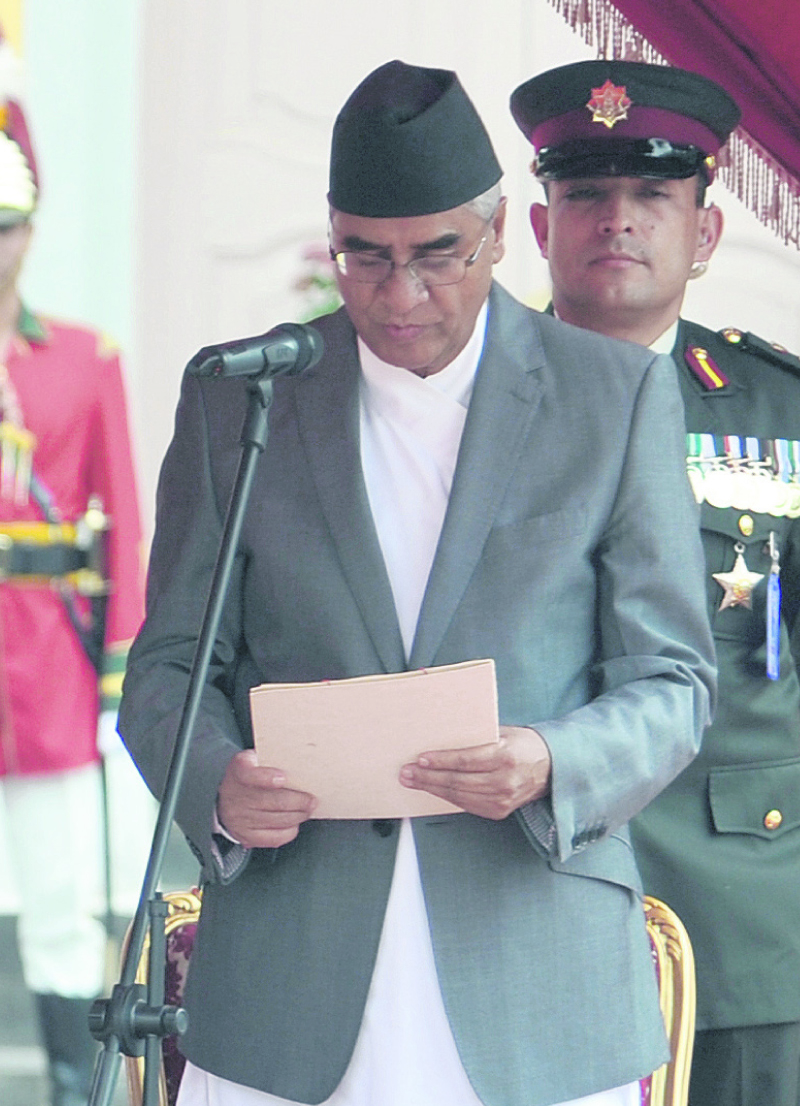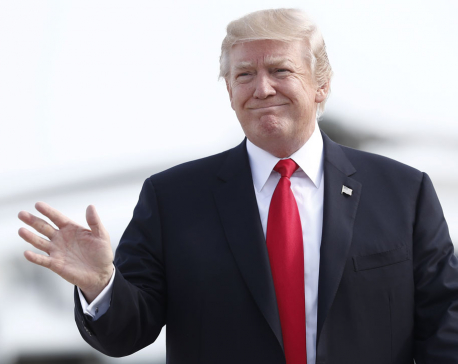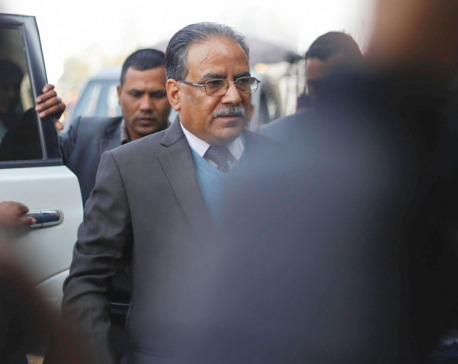
OR
Deuba’s return to power: Can he prove doubters wrong?
Published On: June 8, 2017 07:37 AM NPT By: Roshan Sedhai

KATHMANDU, June 7: Few Nepali politicians have been luckier than Nepali Congress President Sher Bahadur Deuba. He led the government three times before reaching the prime of his political career. Deuba first became the prime minister in 1995, benefiting from a bitter power struggle between the then party president Girija Prasad Koirala and Ganesh Man Singh. It was a remarkable feat for a second-rung leader with his roots in the far-western region which until then was politically excluded.
Deuba again became the prime minister in 2001 and 2004.
But each of his tenure proved a ‘curse’ to Nepal’s nascent democracy, a period marked by the rise of the Maoist insurgency, repeated royal coups, political instability and widespread corruption, signing of controversial treaty with India, and split in the NC.
As King Gyanendra disgracefully deposed him from power on two different occasions raising questions over his competence, many of his critics thought that was the beginning of the end of Deuba’s political career. Some others including his political rivals have often ridiculed him questioning his competence to lead the country.
Twelve years later, Deuba has proved many of his critics wrong with a spectacular return to the center stage of Nepali politics once again. With near two-thirds majority in his pocket, Deuba has not only made a roaring comeback as Nepal’s new prime minister, fifteen months after he was elected the leader of the unified NC, the largest party in the country, but also has become more powerful than ever.
But a key question remains to be answered: Can Deuba prove his doubters wrong? Will his fourth innings as the PM be any different from his past stints or will he go down in history as an unsuccessful prime minister yet again?
Opinions remain divided. While some appear hopeful that Deuba will improve his questionable legacy, many others are not so optimistic due to several controversial decisions including the unsuccessful attempt to impeach outgoing Chief Justice Shusila Karki, promote DIG Jaya Bahadur Chand to the post of IGP.
However, most seem to agree that the new tenure has come as both a challenge and an opportunity for Deuba.
The challenges which await Deuba’s fourth term are bigger than those of many other prime ministers in recent times. On the one hand, Deuba’s government is left with the Herculean task of bringing the agitating Madhesi parties on board and concluding elections of the local, provincial and central governments within the constitutional deadline of January 2018. On the other hand, he faces the odds to keep the beleaguered NC party intact and strong by accommodating multiple factions.
“His success or failure will depend on how tactfully he handles Nepal’s domestic and foreign affairs besides managing the party. There are challenges but there are opportunities as well. If he gained the expected success on these fronts, that can be extremely rewarding,” said Professor Krishna Pokharel.
Experts said that Deuba’s tenure will also be defined by the commitment he shows to upholding the independence of the judiciary, promoting good governance and tackling corruption.
Pokharel opined that Deuba will be under pressure to deliver this time due to the good track records of his predecessors.
“Sushil Koirala went down the history book as a prime minister who promulgated the new constitution. Oli stood against the Indian blockade and ended Nepal’s dependence on a single country, India, by signing a trade and transit treaty with China. Similarly, Dahal bagged the credit for holding the first round of polls and engaging with Madhesi parties. There is already pressure on Deuba to prove himself,” said Pokharel.
In his address to parliament just ahead of his election on Tuesday, Deuba reaffirmed his commitment to democracy and socialism championed by his party but refrained from making any big promises. He said that the sole focus of his government will be to implement the constitution.
Will he walk the talk? He has nine months.
You May Like This

Bhattarai will end up nowhere if he does not return home: Dahal
KATHMANDU, March 15:CPN (Maoist Center) Chairman Puspa Kamal Dahal has said that he repeatedly urged Dr. Baburam Bhattai, coordinator of... Read More...

Trump asserts all agree he has 'complete power' to pardon
WASHINGTON, July 23: President Donald Trump said Saturday that he has "complete power" to issue pardons, an assertion that comes... Read More...

PM Dahal says he has less property as he transferred it to the party
KATHMANDU, Dec 17: Prime Minister and Chairman of CPN (Maoist Center) Pushpa Kamal Dahal has clarified that he has less... Read More...





Just In
- Health ministry to conduct ‘search and vaccinate’ campaign on May 13
- Indian customs releases trucks carrying Nepali tea, halted across Kakarbhitta
- Silent period for by-election to begin from midnight
- SC issues short-term interim order to govt and TU not to take immediate action against TU legal advisor Khanal
- National consultation workshop advocates to scale up nutrition smart community in Nepal
- Patan High Court issues short-term interim order to halt selection process of NTB’s CEO
- NEPSE inches up 0.15 points; daily turnover increases to Rs 2.53 billion
- Bagmati Govt mandates tri-lingual signboards in offices













Leave A Comment